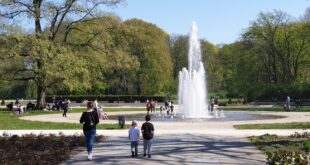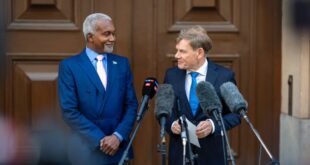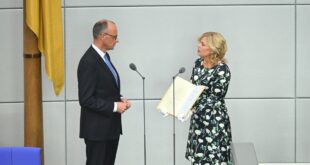Chancellor Olaf Scholz has announced that he wanted to end all restrictions to multiple nationality in the country’s citizenship law.
Speaking at an event to mark the tenth anniversary of the scholarship and mentoring programme GEH DEINEN WEG (Go your way) of the Deutschlandstiftung Integration (German Foundation for Integration) in Berlin on Monday, he said 50 per cent of naturalisations are already approved with the acceptance of multiple nationality and that it was difficult to explain why it wasn’t yet the case for the others.
It is often difficult to cut the last link to the country of origin, Scholz said. Therefore, it was right to modernise German nationality law with this perspective in mind. He wants to bring the citizenship law up to the most modern level worldwide and anchor a universal recognition of multi-nationality in it.
“I want to live in a country where everyone can develop according to their wishes; where everyone is accepted as an individual; and where no distinction is made between ‘us’ and ‘them’. It is for precisely this country that I am Federal Chancellor,” Scholz declared.
Germany has strict rules that prevent multi-nationality in addition to long residency and language requirements for naturalisation. As a result, the country has one of the lowest levels of naturalisation in the EU.
Among other things, the governing coalition of SPD, Greens and FDP has pledged in its coalition agreement to create a “modern citizenship law” that would permit the holding of multiple nationality and “simplify the route to obtaining German citizenship”.
For example, the coalition wants to make naturalisation possible after five years of residence or three for people who are “exceptionally integrated”. So far, foreign residents usually have to wait for eight years. Analysts expect a legislative package for the citizenship law reform to be submitted to the federal parliament next year.
Around 14 percent of the population, about 11.8 million people, currently live in Germany with a foreign passport.
The chancellor also spoke on his government’s plan to grant regular residence permit to asylum-seekers who have been living in Germany for more than five years with a so-called ‘tolerated stay permit’ (Duldung). A total of up to 105,000 people, whose deportation has been repeatedly suspended up to now, could benefit from the plan.
“One of the government’s first projects will be to develop a right of residence with opportunities that will help those who have been here for a long time, who are well integrated and who are looking for prospects, to actually get them,” Scholz said.
“This will give them the chance to realise what they have in themselves, so to speak, as a contribution to society. And we now want to quickly pass the legislative package with which all this is connected. It is about turning uncertain prospects into secure prospects. It will come quickly, and that is good progress for our country,” he added.
Scholz took over the patronage of the Deutschlandstiftung Integration from his predecessor Angela Merkel at the event. The organisation says it “is particularly committed to young people with a migration background in order to open up opportunities for them in training and education as well as in entering the labour market”.
In addition to campaigning and public relations work, the scholarship and mentoring programme GEH DEINEN WEG is at the heart of its activities. According to the foundation, more than 1,200 scholarship holders with migration biographies have been supported by the programme so far. The Chairman of the foundation’s Council, former President Christian Wulff, congratulated the scholarship recipients. They could be “proud to have made such a positive impact on our society with their success stories.”
Femi Awoniyi
 THE AFRICAN COURIER. Reporting Africa and its Diaspora! The African Courier is an international magazine published in Germany to report on Africa and the Diaspora African experience. The first issue of the bimonthly magazine appeared on the newsstands on 15 February 1998. The African Courier is a communication forum for European-African political, economic and cultural exchanges, and a voice for Africa in Europe.
THE AFRICAN COURIER. Reporting Africa and its Diaspora! The African Courier is an international magazine published in Germany to report on Africa and the Diaspora African experience. The first issue of the bimonthly magazine appeared on the newsstands on 15 February 1998. The African Courier is a communication forum for European-African political, economic and cultural exchanges, and a voice for Africa in Europe.



































